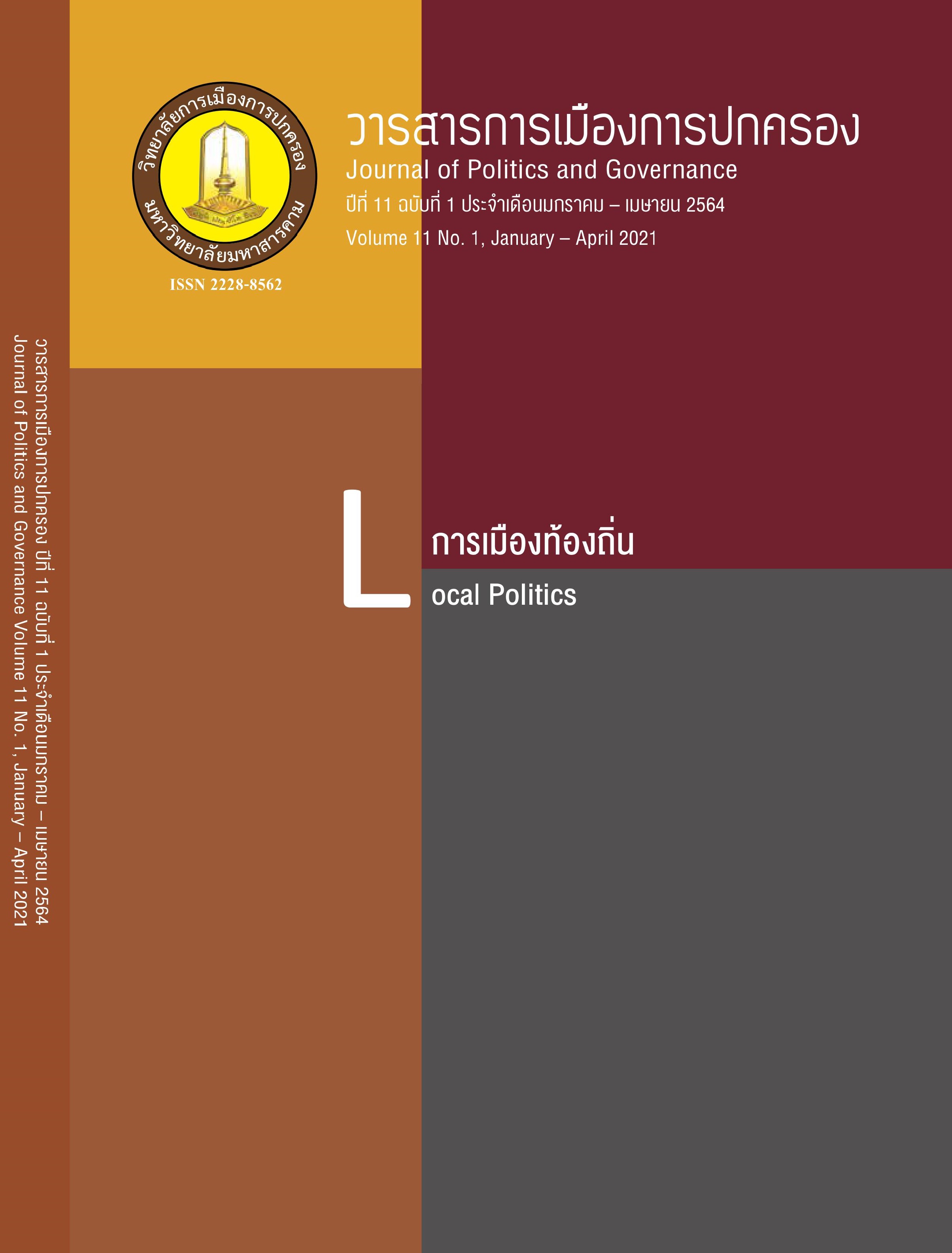Nepotism in Patronage System and Operation of Local Administrative Organization: A Case Study of the Local Administrative Organization in Muang District of Nakhon Ratchasima Province
Main Article Content
Abstract
The goal of this research is to study the dynamics of local politics that consist of a nepotistic patronage system and the relations between nepotism in patronage system and operation of local administrative. The approach implemented under the conformations of “Qualitative Research” with text studies and the “Observation” for data from political activities in the area and the interview. The study initiates that the politic lies under Nepotism in patronage system concur to the local politic system that transmits to patronage system of family and relatives through the descendants of those local politicians. This relation remains invariably and reproduces to create local politic system. This system includes the power structures under “Elite Regime” where the power was shaped from traditions composing with the influential power which also has led to the lawful power of this group whom considered as the top of political pyramid. This power grows under the subject political culture and local deliberative political culture. It is also found that the system results in the local administrative organization’s directions. There are 3 positive supporting sides which are (1) effective local area development, (2) quick resolution in urgent issues and (3) create political stability and mitigate the political conflicts.
Article Details
References
คริส เบเคอร์ และผาสุก พงษ์ไพจิตร. (2557). ประวัติศาสตร์ไทยร่วมสมัย. กรุงเทพฯ: มติชน.
จรัส สุวรรณมาลา. (2550). วัฒนธรรมการเมืองท้องถิ่นในประเทศไทย. วารสารสถาบันพระปกเกล้า, 5(3), 83 - 106.
เจมส์ ซี สกอตต์. (2545). การเมืองในระบบผู้อุปถัมภ์กับผู้รับอุปถัมภ์และการเปลี่ยนแปลงทางการเมืองในเอเชียตะวันออกเฉียงใต้ [Patron-client Politics and Political Change in Southeast Asia]. (ปรีชา คุวินทร์พันธุ์, ผู้แปล). ใน อมรา พงศาพิชญ์ และปรีชา คุวินทร์พันธุ์ (บรรณาธิการ), ระบบอุปถัมภ์ (พิมพ์ครั้งที่ 3). จุฬาลงกรณ์มหาวิทยาลัย. กรุงเทพฯ.
ณัชชานุช พิชิตธนารัตน์. (2558). แนวคิดวิเคราะห์โครงสร้างอำนาจท้องถิ่นในประเทศไทย. วารสารเศรษฐศาสตร์การเมืองบูรพา, 3(2), 1 - 28.
ธีรยุทธ บุญมี. (2533). ระบบอุปถัมภ์ในสังคมไทย. ใน สังคมและวัฒนธรรมไทย. นนทบุรี:มหาวิทยาลัยสุโขทัยธรรมาธิราช. 193 - 217.
ปธาน สุวรรณมงคล. (2554). การเมืองท้องถิ่น: การเมืองของใคร โดยใคร เพื่อใคร. นนทบุรี: จตุพร ดีไซน์.
ปิยนาถ บุนนาค. (2532). ระบบเครือญาติและระบบอุปถัมภ์. ใน วิวัฒนาการการเมืองไทย. นนทบุรี: มหาวิทยาลัยสุโขทัยธรรมาธิราช. 209-251.
พรชัย เทพปัญญา. (2548). ประชาธิปไตยไทยจากมุมมองทฤษฎีชนชั้นนำ. วารสารสถาบันพระปกเกล้า, 3 (2), 16 - 25.
พิชาย รัตนดิลก ณ ภูเก็ต. (2552). โครงสร้างอำนาจท้องถิ่น ความขัดแย้ง และการเปลี่ยนแปลง. กรุงเทพฯ: จรัลสนิทวงศ์การพิมพ์.
ภัทรานุช ทิมภินันท์. (2559). การเล่นพรรคเล่นพวกกับความขัดแย้งในธุรกิจครอบครัวขนาดเล็ก. (ค้นคว้าอิสระบริหารธุรกิจมหาบัณฑิต). มหาวิทยาลัยธรรมศาสตร์, กรุงเทพฯ.
ศิราพร ฐิตะฐาน. (2532). ระบบครอบครัวและเครือญาติในสังคมไทย. ใน สังคมและวัฒนธรรมไทย. นนทบุรี: มหาวิทยาลัยสุโขทัยธรรมาธิราช. 219-252.
สนิท สมัครการ. (2528). ระบบครอบครัวและเครือญาติกับการเมืองไทย. ใน พื้นฐานทางสังคมและวัฒนธรรมของการเมืองไทย. นนทบุรี: มหาวิทยาลัยสุโขทัยธรรมาธิราช. 193-255.
สนิท สมัครการ. (2533). สถาบันครอบครัว เครือญาติ และระบบอุปถัมภ์. ใน สังคมไทย. นนทบุรี: มหาวิทยาลัยสุโขทัยธรรมาธิราช. 1-42.
________. (2545). มีเงินก็นับว่าน้อง มีทองก็นับว่าพี่: ระบบครอบครัวและเครือญาติของไทย (พิมพ์ครั้งที่ 6). กรุงเทพฯ: องค์การสงเคราะห์ทหาผ่านศึก.
สมศักดิ์ สามัคคีธรรม. (2554). การสถาปนาอำนาจของผู้ไร้อำนาจ. กรุงเทพฯ: มาฉลองคุณ ซีเอสบี.
อคิน รพีพัฒน์. (2540). เครือญาติ การแต่งงานกับระบบสังคมไทย [Clienship and Class Structure in the Early Bangkok Period]. (วิมาลา ศิริพงษ์, ผู้แปล). ใน เจ้าชาวบ้านเล่ม 2.
ปริตตา เฉลิมเผ่า กออนันตกูล (บรรณาธิการ). กรุงเทพฯ: สถาบันไทยคดีศึกษามหาวิทยาลัยธรรมศาสตร์. 77-103.
อมรา พงศาพิชญ์ และปรีชา คุวินทร์พันธุ์. (2545). ระบบอุปถัมภ์ (พิมพ์ครั้งที่ 3). กรุงเทพฯ: จุฬาลงกรณ์มหาวิทยาลัย. Arsim GJINOVCI. (2016). The impact of nepotism and corruption on the economy and HR. Economic and Environmental Studies, 16(3), 421-434.
Padgett, M. Y., & Morris, K. A. (2000). The impact of sex-based preferential selection on subordinate perceptions of a new supervisor. Paper presented at the 2000
Administrative Sciences Association of Canada conference in Montreal, QC.


